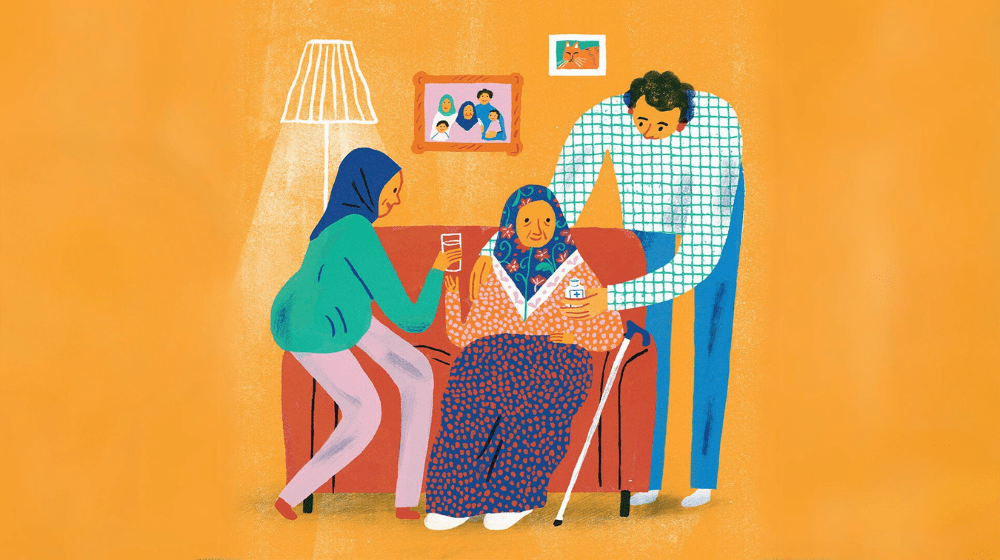Unpaid care work is essential to the functioning of households and communities, yet it is often overlooked and undervalued. There is no country in the world where unpaid work is equally shared by men and women. Instead, responsibilities such as tending to children, nursing sick family members, cooking meals and cleaning the home (among many others) have been disproportionately shouldered by women.
In Eastern Europe and Central Asia, women spend on average 2.5 times more time on unpaid work than men. This gap has barely changed over the past three decades despite legal and policy advances in women’s rights and gender equality, suggesting that cultural norms around gender roles remain hard to overcome.
This imbalance has consequences for women, men and society as a whole. On the International Day of Care and Support, UNFPA is outlining some of the ways women continue to pay an unfair price for their unpaid care work – and stressing the need to better support women inside and outside of the home.
1. Economic costs
Participation in the labour market is a key source of economic empowerment. But women say unpaid work is one of the main barriers preventing them from entering and remaining in the workforce.
In the Eastern Europe and Central Asia region, employment levels for women vary, but there is on average around a 25 per cent gap between men and women in their labour force participation.
For women who do enter the paid workforce, care duties can negatively impact the types of work they are offered and their opportunities for advancement, leading to gender gaps in income and future pensions. Women make up a larger share of the informal sector, which allows more flexibility to handle their home responsibilities but usually leaves women vulnerable to lower pay and fewer protections for their rights.
Meanwhile, women who have no form of paid employment may become financially dependent on their partners, family members or others. This could put their agency at risk and weaken their decision-making power within the household.
2. Other opportunity costs
Unpaid care work not only hinders women’s participation in the labour market but also in other areas outside of the home. Opportunities for educational advancement and skills training might be missed when women’s time and energy are consumed with unpaid care work.
Also, with less time available than men, women are less likely to be civically engaged or take on decision-making roles in government, civil society organizations and businesses.
Central Asia has the second-lowest level of gender parity in political empowerment, and many national legislatures across our region still have less than 30 per cent of their seats held by women. This absence of female voices in already male-dominated spheres could lead to the creation, or continuation, of policies that limit women’s rights and future prospects.
3. Health and well-being costs
The pressure and expectation of managing the bulk of all caregiving tasks can take a significant toll on women’s mental health. They have little time for rest and leisure or self-care, which over time can harm their self-esteem and well-being.
Moreover, as mentioned earlier, women who are economically dependent in their households tend to have less decision-making power, increasing their risk of gender-based violence, including infringements on their bodily autonomy and sexual and reproductive health choices.
An international survey including women from Eastern Europe and Central Asia showed that women in lower income brackets were more likely to experience different forms of violence.
What can be done to share these costs more equally?
While encouraging more women to take on formal employment is key to their empowerment, it must done alongside policies that recognize, reduce and redistribute the amount of unpaid work they face. Otherwise, it could exacerbate the overall burden on women by giving them a “second shift.”
UNFPA’s flagship “Expanding Choices” programme, launched with the support of the Austrian Development Agency (ADA), promotes gender-responsive family policies that encourage men to take on their fair share of household and care duties, while enabling women to have more time and resources to fulfil their career aspirations without sacrificing their family priorities.
Since launching the programme in the Western Balkans and Moldova in 2019, UNFPA has worked with 25 private sector companies to implement family-friendly workplaces that take into account the needs of care work, such as remote work options, flexible hours, paid leave for child and family care, and lactation rooms in the workplace for both men and women.
UNFPA has also advocated for governments to strengthen their social infrastructure to reduce some of the burden of unpaid work, such as providing maternity and paternity leave and public child care and education services.
Sharing care responsibilities more equally can help women and men live more balanced, productive and fulfilling lives. That in turn makes companies more inclusive and competitive, while society grows more equal, prosperous and resilient to demographic change.





